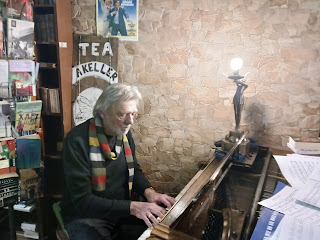Dustin - Music education and drag queens
I met the person introduced here in my penultimate semester at university. Dustin and I attended a course together on the topic of exotification in the scenic arts in dance studies. As there was usually hardly any time to exchange opinions in the course discussions and I was impressed by Dustin's statements and ability to reflect, I invited him to my home one Sunday morning for an interview. This turned into an hour-long conversation about cultural politics, gender roles, the Salzburg Festival, traditional costume clubs and dance. Be curious to meet a multifaceted person!
Dustin lived with his grandmother on the farm as a small child. He describes his home town of Pocking as a sleepy backwater, a culturally and socially dead town, a functional community with no social cohesion. Efforts are being made to create a "place for others", by which he means the Caritas education for the disabled. Meter-high, opaque fences have been built around the building, so the residents do not participate in city life.
Dustin worked with mixed-age inclusive groups as part of his degree focus on inclusion and diversity. Although there is a willingness to engage in dialog in the arts, hierarchies and Eurocentric thinking still exist.
Dustin learned to play the accordion at his Catholic school and performed his first drag performances, practising dance lifts in PE lessons as a bird of paradise. He not only grew up with this, but also with the local Bavarian traditional costume club. Today, its strict rules no longer reflect his convictions, but he sees the group as part of himself. It's not just the experience with the customs that connects us both, but also the idealization of the Austrian Empress Sissy. His role models today are a former teacher, Cornelia Funke and Jane Goddall.
When asked why he only mentions women, he describes the problematic relationship with his stepfather and the fact that he never had men as caregivers except in a romantic sense. In relation to women, Dustin says that a system that oppresses you is the connecting element to the rainbow movement. As a bisexual woman, I can subscribe to this statement. As a queer person, Dustin is sometimes seen as a fetish object by men at parties, but other men also reflect this and can be friends with queer people.
He talks about discrimination and how he was not accepted into a choir because he wore a glitter scarf as a primary school child. As a teacher, he experiences stigma less from the children and more from parents or the school management. He sees music and dance as important for every child who wants to try these things, which is why he leads a choir project at home. He tells us to always dance, to see people in the same way as children, without filters, to interact more with "other" people and not to differentiate between high culture and popular culture





Kommentare
Kommentar veröffentlichen